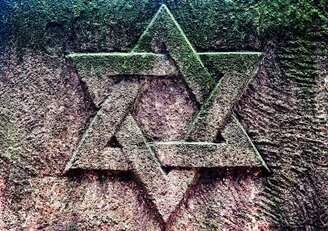
We have a history, Dracula and me. When I was thirteen, I read half of Bram Stoker's Dracula for the first time. I was petrified. I'm not completely sure just what terrified me at that time- but there was something beyond the fact that I was a highly sensitive young person who scared easily and tended to avoid horror stories. Something about a beloved person dying and then transforming into a monster that would destroy everyone she loved frightened me to the point that I couldn't sleep.
Now I wasn't completely stupid, even at thirteen. My rational mind did know it was fiction and that vampires didn't really exist. At least I knew that in the light of day. But when the sun set and we all went to bed, my irrational mind took over. I still remember lying awake, hearing branches brush against the windowpanes, and worrying whether it was Dracula trying to get into my house. In the morning after a sleepless night, I asked my parents if I could have a crucifix -- since in the book that was the one thing that would keep Dracula at bay.
I'm Jewish. Proudly Jewish. My parents -- even more so.
My parents, with the knowledge that vampires aren't real but with the additional knowledge that they had a scared and slightly crazy young teen who had stayed up all night, came up with a compromise. My father bought me a mezuzah necklace - a small silver cylinder that contains the holiest prayer in Judaism, the Shema. If I wore it, it would keep off vampires, my father told me. I wasn't so sure. I wasn't convinced that vampires would recognize or fear Jewish prayers. I wore it anyway, and it did calm me down. (I still wear the mezuzah not to ward off vampires but in memory of my father.)
I also returned Dracula to the library without finishing it.
It was years before I took up Dracula again and finished it. By then, I was in college and more in control of my mind -- or as in control as anyone in college might be. I never forgot how powerfully the book had affected me at the age of thirteen, but by that point I could analyze books with a bit more skill. I noted with amusement the association of evil and sexuality, how the descriptions of women who were not vampires emphasized their purity, and those of vampires, their sexuality. I was also fascinated by the origins of the Dracula myth -- how Stoker had incorporated real history into the creation of his vampire, that of a Romanian ruler from the Middle Ages, known alternatively as Vlad Tepes or Vlad the Impaler, who had particularly sadistic methods of execution.
(As a side note, when I created my villain for Trojan Horse, the first of my thriller novels, I reached back into that early terror. I couldn't resist. My villain Mihai Cuza, an anti-Semitic descendant of Vlad the Impaler, has nothing of the supernatural about him, but he likes to imitate his ancestor when killing people and he's particularly sadistic towards my Russian-Jewish protagonist.)
But interestingly, an article I recently read about Dracula has changed my perspective on that thirteen-year-old experience. Rob Silverman-Ascher recently wrote "The Antisemitic History Of Vampires" in the publication Alma. I had never made the association between anti-Semitic stereotypes and Dracula, but once he laid it out, I was convinced.
First, Dracula's physical description emphasized a hooked nose and bushy hair, both of which occur in caricatures of Jewish people. He hoards wealth. His house, while large was “that neglected that yer might ‘ave smelled ole Jerusalem in it.” - Chapter 17, page 7. The choice of Jerusalem -- interesting.
According to the article, Dracula was written in the time period when Jewish immigrants, fleeing pogroms in Eastern Europe for London, were being described as a "parasitical race with no ideals beyond precious metals" in the British periodical, The Spectator. Silverman-Ascher also notes that Dracula is Eastern European, with an accent, and he is the ultimate parasite, just as Jews have been described as parasites. Dracula exists off the blood of the living, invoking images of the blood libel -- Jews killing Christian babies to make matzah -- that has been the rationale for massacres of Jews for centuries. Then there's the even creepier stuff - the sexual degeneracy terms used to describe Dracula's preying on young innocent Christian women - that parallels how Jews were portrayed as preying on beautiful German women in Nazi propaganda.
And finally, the coup de grace, Dracula cannot bear the sight of a cross or the touch of Christian objects. Yup, Jewish caricature.
Maybe what should have frightened my thirteen-year-old self was not the thought of Dracula breaking into my house but the thought that anti-Semitic tropes were used to create him and that those kind of tropes were used as justification for murdering people like me and my parents in the years before my birth.
That doesn't mean we should ban Dracula. Just be aware that it does use troubling anti-Semitic stereotypes - as well as outdated ideas about sexuality. And the modern versions of Dracula, as noted in Silverman-Ascher's article, have moved away from the more problematic tropes to more diverse and less frightening imagery of vampires - for example Twilight's shiny and helpful vampires who drink animal blood. I personally have a lot of fondness for Spike and Angel - the sometimes good, sometimes bad vampires from the late 1990s, early 2000s television series -Buffy the Vampire Slayer.
Anyway, it's Halloween. Who doesn't love a good vampire story at Halloween?
Now I wasn't completely stupid, even at thirteen. My rational mind did know it was fiction and that vampires didn't really exist. At least I knew that in the light of day. But when the sun set and we all went to bed, my irrational mind took over. I still remember lying awake, hearing branches brush against the windowpanes, and worrying whether it was Dracula trying to get into my house. In the morning after a sleepless night, I asked my parents if I could have a crucifix -- since in the book that was the one thing that would keep Dracula at bay.
I'm Jewish. Proudly Jewish. My parents -- even more so.
My parents, with the knowledge that vampires aren't real but with the additional knowledge that they had a scared and slightly crazy young teen who had stayed up all night, came up with a compromise. My father bought me a mezuzah necklace - a small silver cylinder that contains the holiest prayer in Judaism, the Shema. If I wore it, it would keep off vampires, my father told me. I wasn't so sure. I wasn't convinced that vampires would recognize or fear Jewish prayers. I wore it anyway, and it did calm me down. (I still wear the mezuzah not to ward off vampires but in memory of my father.)
I also returned Dracula to the library without finishing it.
It was years before I took up Dracula again and finished it. By then, I was in college and more in control of my mind -- or as in control as anyone in college might be. I never forgot how powerfully the book had affected me at the age of thirteen, but by that point I could analyze books with a bit more skill. I noted with amusement the association of evil and sexuality, how the descriptions of women who were not vampires emphasized their purity, and those of vampires, their sexuality. I was also fascinated by the origins of the Dracula myth -- how Stoker had incorporated real history into the creation of his vampire, that of a Romanian ruler from the Middle Ages, known alternatively as Vlad Tepes or Vlad the Impaler, who had particularly sadistic methods of execution.
(As a side note, when I created my villain for Trojan Horse, the first of my thriller novels, I reached back into that early terror. I couldn't resist. My villain Mihai Cuza, an anti-Semitic descendant of Vlad the Impaler, has nothing of the supernatural about him, but he likes to imitate his ancestor when killing people and he's particularly sadistic towards my Russian-Jewish protagonist.)
But interestingly, an article I recently read about Dracula has changed my perspective on that thirteen-year-old experience. Rob Silverman-Ascher recently wrote "The Antisemitic History Of Vampires" in the publication Alma. I had never made the association between anti-Semitic stereotypes and Dracula, but once he laid it out, I was convinced.
First, Dracula's physical description emphasized a hooked nose and bushy hair, both of which occur in caricatures of Jewish people. He hoards wealth. His house, while large was “that neglected that yer might ‘ave smelled ole Jerusalem in it.” - Chapter 17, page 7. The choice of Jerusalem -- interesting.
According to the article, Dracula was written in the time period when Jewish immigrants, fleeing pogroms in Eastern Europe for London, were being described as a "parasitical race with no ideals beyond precious metals" in the British periodical, The Spectator. Silverman-Ascher also notes that Dracula is Eastern European, with an accent, and he is the ultimate parasite, just as Jews have been described as parasites. Dracula exists off the blood of the living, invoking images of the blood libel -- Jews killing Christian babies to make matzah -- that has been the rationale for massacres of Jews for centuries. Then there's the even creepier stuff - the sexual degeneracy terms used to describe Dracula's preying on young innocent Christian women - that parallels how Jews were portrayed as preying on beautiful German women in Nazi propaganda.
And finally, the coup de grace, Dracula cannot bear the sight of a cross or the touch of Christian objects. Yup, Jewish caricature.
Maybe what should have frightened my thirteen-year-old self was not the thought of Dracula breaking into my house but the thought that anti-Semitic tropes were used to create him and that those kind of tropes were used as justification for murdering people like me and my parents in the years before my birth.
That doesn't mean we should ban Dracula. Just be aware that it does use troubling anti-Semitic stereotypes - as well as outdated ideas about sexuality. And the modern versions of Dracula, as noted in Silverman-Ascher's article, have moved away from the more problematic tropes to more diverse and less frightening imagery of vampires - for example Twilight's shiny and helpful vampires who drink animal blood. I personally have a lot of fondness for Spike and Angel - the sometimes good, sometimes bad vampires from the late 1990s, early 2000s television series -Buffy the Vampire Slayer.
Anyway, it's Halloween. Who doesn't love a good vampire story at Halloween?

 RSS Feed
RSS Feed